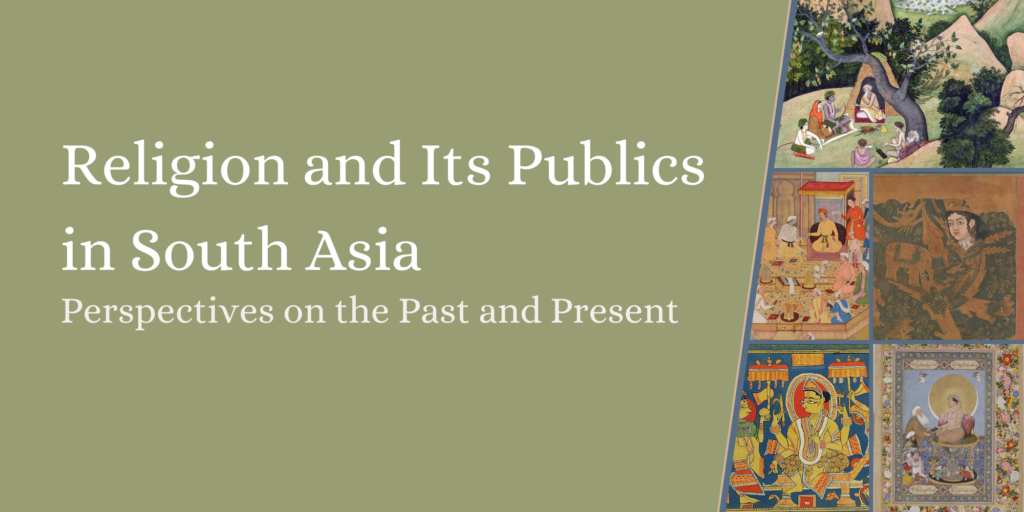
Image adapted from The Fabulous Creature Buraq by unknown author and a painting by Nar Singh (Public Domain)
A virtual conference sponsored by Canopy Forum and the Center for the Study of Law and Religion at Emory (CSLR) featuring scholars, experts and practitioners who will examine the many religious traditions of South Asia and their diverse publics. Participation by invitation only. View selected videos and browse all essays here.
“The Politics of Prophetic Love in South Asia”

SherAli Tareen
How did the loss of Muslim political sovereignty in South Asia, in the aftermath of the Mughal Empire and the ascendence of British colonial power in the nineteenth century, generate new and contested visions of sovereignty centered on the figure and body of Prophet Muhammad? This is the central question that animates my brief comments. I will take up this question in the context of some prominent moments of intra-Muslim and inter-religious scholarly contest in colonial South Asia that made centrally visible novel conceptions of religion, politics, and publics. The politics of defending and offending prophetic honor, visible most dramatically today in public discourses surrounding the question of blasphemy, has generated some vexing conundrums. Most notably, how should one navigate the seeming impasse between blatantly Islamophobic secular theologies wrapped in the discourse of free speech and pathological inheritances of tradition that result in catastrophic consequences for religious minorities in Muslim majority contexts like Pakistan? This is a thorny but pressing question that demands a practice of double critique avidly resistant to both secular semiotic ideologies and religious regimes that rely on unfiltered translations of premodern imperial political theologies in the modern world. But the binary division between liberal secular free speech and the illiberal defense of prophetic honor through the category of blasphemy forecloses an important question: what sorts of transformations did the rupture of colonial modernity effect in the very manner in which the figure of Prophet Muhammad was imagined and approached in the Muslim intellectual tradition? And what kinds and forms of intra-Muslim and inter-religious contestations over the normative persona and potency of the Prophet did such transformations generate? Modern South Asia is among the most analytically fertile theaters in which to pose and address these questions.
In my first book Defending Muhammad in Modernity, I examined a long running and to this day hugely consequential as well as controversial intra-Muslim scholarly polemic centered in large measure on competing imaginaries of Prophet Muhammad that corresponded with opposing conceptions of moral publics in conditions of colonial modernity. This polemic pitted the pioneers of two of the most influential and formidable Sunni Muslim reform movements in South Asia, the Deobandis and Barelvis (named after the towns of Deoband and Bareilli in Northern India where the founders of this movement were from) against each other. It centered around the question of how one ought to imagine the relationship between divine sovereignty, prophetic charisma, and the practice of everyday life during a moment (the late nineteenth century) when Indian Muslims had lost their political sovereignty. Among other arguments, a core argument of the book is that in this rather dense and contentious though also often sophisticated intra-Muslim polemic, the figure of the Prophet emerged as a synecdoche for sovereign power in the ruins of Muslim imperial sovereignty. For the Deoband scholars, restoring and preserving the primacy of divine sovereignty required a view of the Prophet that emphasized and celebrated his humanity and his subservience to God. The perfection of the Prophet’s prophethood depended on the perfection of his humanity. This position not only animated their vigorous critique of popular ritual practices like the annual celebration of the Prophet’s birthday; it also informed their provocative positions on sensitive theological questions such as the Prophet’s knowledge of the unknown and God’s capacity to produce a second Muhammad. In contrast, for Barelvi scholars such as the polymath founder of the school Ahmad Raza Khan (d. 1921), divine sovereignty and prophetic authority were mutually constitutive. It was only by embracing the Prophet’s ontological exceptionalism (rather than his mortal humanity) as God’s most beloved subject that divine sovereignty was accessed and confirmed. Therefore, it was nothing short of anathema to undermine let alone criminalize popular avenues of exalting the Prophet like his birthday celebration, a major Muslim devotional ritual performed throughout the world. And even raising questions like that of whether God can create another Muhammad signaled impertinence of heretical proportions. At stake in this polemic thus were competing visions of the normative relationship between divine sovereignty, prophetic authority, and everyday ritual practice—what I called “competing political theologies”—in conditions of colonial modernity.
Put differently, at stake in this intra-Muslim contest was the status of Muhammad in modernity, as each side sought to defend and mobilize its version of normative Muhammad as a vehicle of religious reform and the curation of a moral public. In this scheme, Muhammad’s sovereign power, either as the perfect human servant of God or as God’s most exceptional beloved, compensated for the absence of Muslim political sovereignty. The body of the Prophet served as a sovereign bulwark during a moment fraught with the crisis of sovereignty. In a recent forum on my book, historian Faisal Devji succinctly captured some of the haunting paradoxes shadowing the anxiety over sovereign certainty in intra-Muslim debates such as the Deobandi-Barelvi polemic. He wrote:
“On the one hand, a sovereignty unavailable to colonized peoples might have been displaced onto God as a kind of compensation. On the other hand, its expulsion from the world of mortals may indicate a deep suspicion of sovereignty and the modern state it represents. Having been stripped of its own political tradition, in other words, new forms of Islamic thought were magnetized by the idea of sovereignty, in a way not so very different from anti-colonial nationalism.”
Another of Devji’s statements in this same essay curiously titled “Prophet Motive” connects more directly to the main theme of my comments here, and also connects the colonial and the contemporary contexts: “Controversies about the Prophet’s status,” Devji wrote, “rehearse a political as much as theological paradox, since the very effort to expel sovereignty from human society while preserving it elsewhere sets the stage for its spectacular return.” This is a helpful framing with which to approach the “spectacular return” indeed of the question of prophetic honor and love in recent protests and discourses over blasphemy in settings like Pakistan that have witnessed the further intensification of the crisis of sovereignty in popular consciousness and everyday life. The instability of sovereign agency over the contingencies of life is increasingly compensated by the fantastical figure of a Prophet at once incorruptible and yet always vulnerable to injury. The pathological patrolling of prophetic love not only borrows liberally (pun intended) from a distinctly Christian political theology of blasphemy; it also signals a rather fascinating interplay of masculine certainty and endemic fragility mapped onto the body of the Prophet.
But despite these conceptual continuities, there are also some important points of disjuncture marking the contemporary moment. Let me mention two. First, while it is easy to get caught up in the proliferation of intra-Muslim divisions in the postcolonial context, we have also seen the emergence of some curious alliances between otherwise arch rivals. For instance, the recent movement and protests over blasphemy in Pakistan have often brought together the otherwise bitterly opposed Barelvi and Deobandi scholars in a common program of defying the state and non-state modernist elite. The lines of activity between specialist scholars (called the ‘ulama’) and more popular preachers and activists have also been often blurred, as seen most dramatically in the rise of the popular outfit Tehrik-i Labayk Ya Rasul Allah (TLYR) that has frequently sucked in ‘ulama’ actors in their drive to protect prophetic honor even as it cuts into the latter’s’ religious authority in the marketplace of moral persuasion.
While it is easy to get caught up in the proliferation of intra-Muslim divisions in the postcolonial context, we have also seen the emergence of some curious alliances between otherwise arch rivals.
And second, the space for intra-Muslim disagreement on sensitive theological questions has certainly shrunk; a century and couple decades later, it is almost unthinkable that questions like, “Can God produce another Muhammad?” or “What’s the difference between Muhammad’s and Satan’s knowledge?” could be debated as transparently and with the sort of intellectual depth and nuance as they were by nineteenth century Barelvi and Deobandi pioneers and their predecessors. Indeed, as I elaborate in the book’s postscript, if nothing else, the Barelvi-Deobandi polemic showcases the potential for intellectual fecundity associated with a fierce yet layered and complex polemical encounter. This is not to suggest some sort of a rise and fall model of history that valorizes the Muslim traditionalist scholars (‘ulama’) of colonial India as occupants of a ‘golden era’ of intellectual valor and sophistication supplanted by the mediocrity of the present. What I am gesturing at rather is an observable constriction in the parameters of doctrinal debate, especially on questions concerning the Prophet.
Another key discursive and political site where representations of the Prophet sought to compensate for sovereign lack is that of interreligious debates in colonial South Asia. I will center my oral comments for the conference on one particularly illustrative and fascinating example of such an interreligious encounter that took the form of a “polemical festival” and consumed leading Muslim and Hindu scholars as well as Christian missionaries for two consecutive years in 1875 and 1876 in Shahjahanpur in Northern India. My presentation will engage some key moments of this polemical spectacle, especially those connected to contestations over the Prophet, to raise larger questions about new formations of religion, sovereignty, history, and notions of the public in colonial South Asia, that continue to cast penetrating shadows over the postcolonial present.♦
SherAli Tareen is Associate Professor of Religious Studies at Franklin and Marshall College. He received his PhD in Religious Studies from Duke University. His research focuses on Muslim intellectual traditions and debates in early modern and modern South Asia. His book Defending Muhammad in Modernity (University of Notre Dame Press, 2020) received the American Institute of Pakistan Studies 2020 Book Prize and was selected as a finalist for the 2021 American Academy of Religion Book Award.
Recommended Citation
Tareen, SherAli. “The Politics of Prophetic Love in South Asia.” Canopy Forum, March 8, 2022. https://canopyforum.org/2022/03/08/the-politics-of-prophetic-love-in-south-asia/.

